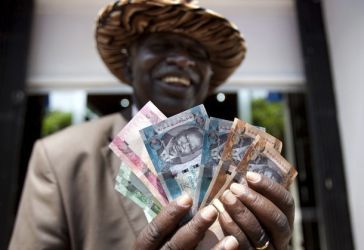S. Sudan anticipates better economic prospects after peace deal
September 17, 2015 (JUBA) – The South Sudanese economy will improve if the hurdles caused by its ongoing conflict are removed and donors reinstated funding to government projects, the country’s finance minister, David Deng Athorbei said on Wednesday.

“All these economic hardships are a result of the absence of peace and if peace was there would be no such economic hardships,” the South Sudanese finance minister told a meeting attended by several European diplomats in the country’s capital, Juba.
“It is the result of war which is in the country, the insurgency in rebel [held] areas that has made it very difficult for us even to bring food from Renk [Upper Nile state],” he added.
South Sudan’s economy, which depends on oil revenues, shrunk after the conflict led to closure of the oilfields in Unity state in December 2013. The reduced oil output, coupled with low global prices of crude oil, led South Sudan government to operate on a deficit budget, leading to severe reduction in overall expenditure.
For instance, the SSP 10.3 billion budget, approved by South Sudan parliament last week, contained a SSP 3 billion deficit. The price per barrel of oil is currently placed at $50 despite the ministry of petroleum initially estimating the price at $40.
This, economists argue, means the correct deficit figures could even be much higher.
The finance minister said the government was committed to fully implement the peace agreement and hopes that the international community will help the country financially.
He also hinted that government was working to ensure accountability and transparency.
“The other issue which we presented to them [donor representatives] is that soon there will be lots of expenditure. There will be people coming from the rebel areas to Juba and some of them will need accommodation [in hotels]. How does the international community come in to help our people. We also presented [this] to them,” added Deng.
The Norwegian ambassador to South Sudan, Tone Tinnes congratulated the government of South Sudan signing the peace agreement and its determination to implement it.
“We will continue to support the South Sudanese people. We are also looking on how we can assist and work together with the transitional government in implementing the peace agreement,” Tinnes told reporters shortly after the meeting held in Juba.
The Norwegian diplomat did not, however, specify what form of support it was extending.
Norway, one of the Troika countries, alongside the United States and Britain funded the Intergovernmental Authority on Development (IGAD) peace mediation for South Sudan.
Donors channelled most aid to humanitarian since the conflict began 20 months ago.
The war was meant to officially ended with the signing of peace agreement by President Salva Kiir and rebel leader Riek Machar last month. According to the accord, Machar will become the first vice president in the transitional government of national unity that will run the nation for 30 months. The transitional government is to be formed by November.
(ST)
